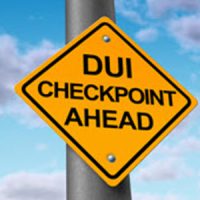Five Key DUI Checkpoint Requirements

The Supreme Court permanently legalized sobriety checkpoints, which allow law enforcement officers to bypass the Fourth Amendment, in 1990. Because the Supremes gave them such broad authority, peace officers must strictly follow many rules when they set up these checkpoints. Otherwise, the roadblock is illegal.
A checkpoint affects your Fourth Amendment stop, search, and seizure rights. But it doesn’t affect your Fifth Amendment rights, such as the right to remain silent. Drivers must obey basic “sop and go” commands. They must also produce certain documents for inspection. Otherwise, however, they have a right to remain silent. They need no answer officer questions or even roll down their windows.
DUI checkpoints are very popular among law enforcement agencies because they make it easier to stop suspected drunk drivers. However, these roadblocks add several more moving parts to a prosecution that already has a lot of them. So, there’s a good chance that a Tampa DUI attorney can invalidate the checkpoint, and therefore the arrest.
Legislative Authorization
Laws are on the books in Florida, and most other states, that approve DUI checkpoints. However, almost no states have amended their Constitutions to allow DUI roadblocks. Therefore, what the Legislature gives, the Legislature could take away, at least theoretically.
Usually, these laws, including Florida’s law, give local law enforcement agencies the authority to set up checkpoints that follow the rules set forth by the Supreme Court and other high-level judicial bodies.
Supervisor Setup
Just like checkpoint authorization came from the top, checkpoint operation must come from the top, at least on the local level.
A county sheriff or other elected official is clearly a “supervisor” in this context. Police chiefs, who only answer to mayors, city councilmen, and other elected officials, are probably supervisors as well. High-level officials in the department, such as captains, might be supervisors. Anyone lower than that, even a lieutenant, is not a supervisor for checkpoint purposes.
Except for the vehicle pullover formula, which is outlined below, the supervisor setup must include every operational detail. If field officers have any discretion, except as outlined below, the roadblock is illegal.
Pre-Roadblock Publicity
Part of this setup includes a pre-checkpoint promotional campaign. Law enforcement agencies cannot simply go through the motions. A Tweet an hour before a checkpoint goes live isn’t sufficient. However, they need not go overboard either. It’s not necessary to set up signs at the proposed checkpoint which announce the date and time.
Legally, the pre-checkpoint publicity must give motorists a chance to avoid the area altogether, if they choose to do so.
On a related note, if Max sees a checkpoint and makes a U-turn to avoid it, a patrol car will most likely shadow him for at least a mile or so, in the hopes that he goes 31 in a 30 or commits another technical traffic violation.
Neutral Formula
Random checkpoints aren’t “random.” Officers cannot detain motorists who look wrong and wave everyone else through. Instead, detentions must follow a neutral formula, such as every third vehicle.
If traffic backs up and forces motorists to wait unreasonably long, officers can change the formula, to something like every fifth vehicle, to decrease the backlog.
Minimal Detention
There’s no set definition of “unreasonably long.” As a rule of thumb, motorists should not have to wait more than about thirty seconds. The clock starts ticking when traffic backs up to the point that a U-turn is unsafe. The clock stops ticking when an officer allows a motorist to proceed.
Rely on a Thorough Hillsborough County Attorney
A criminal charge is not the same thing as a criminal conviction. For a free consultation with an experienced criminal defense lawyer in Tampa, contact the OA Law Firm. We routinely handle matters throughout the Tampa Bay area.
